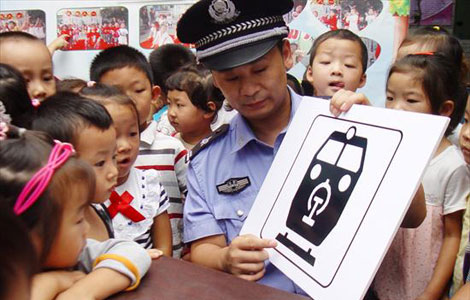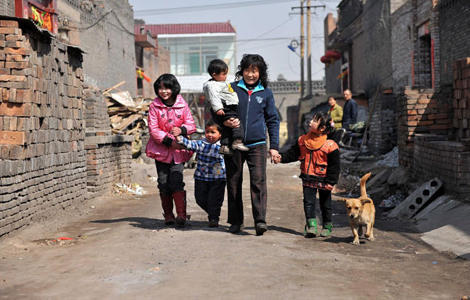China's peaceful development chosen by history
Updated: 2011-09-06 11:32
(Xinhua)
|
|||||||||||
BEIJING - Taking the path of peaceful development is a strategic choice made by the Chinese government and people in keeping with the fine tradition of Chinese culture, the development trend of the times and the fundamental interests of China, says a white paper issued Tuesday.
It is also a choice which China's development calls for, said the paper.
The white paper,titled "China's Peaceful Development", was released by the State Council Information Office. It introduces the path, objective and foreign policy of the peaceful development and elaborates on what China's peaceful development means to the rest of the world.
"Peaceful development carries forward the Chinese historical and cultural tradition, "it says.
The world has been believed to be a harmonious whole in the Chinese culture ever since the ancient times.
This belief has a lasting impact on the thinking and acts of the Chinese nation, which is an important value that the Chinese people follow in handling interpersonal relationships, the relationship between man and nature and relations between different countries.
The Chinese people have always cherished a world view of "unity without uniformity", "harmony between man and nature," and "harmony is invaluable."
This belief calls for the fostering of harmonious family bond, neighborhood harmony and good interpersonal relationships,it says.
Under the influence of the culture of harmony, peace-loving has been deeply ingrained in the Chinese character. The world-renowned Silk Road, for example, was a road of trade, cultural exchanges and peace, which testifies to the pursuit of friendship and mutually beneficial cooperation with other peoples by the ancient Chinese.
The famous Ming Dynasty navigator Zheng He made seven voyages to the Western Seas, visiting over 30 countries and regions across Asia and Africa. He took along with him the cream of the Chinese culture and technology as well as a message of peace and friendship, says the white paper.
Imbued with the belief that one should be as inclusive as the vast ocean which admits hundreds of rivers, the Chinese nation has embraced all that is fine in foreign cultures. This has forged strong cultural ties, leaving behind much-told anecdotes about the cultural interactions between China and the world.
The Chinese have a strong collective consciousness and sense of social responsibility. The paper says "we believe that 'you should not do unto others what you would not have them do unto you.'"
"We respect different cultures and views, treat others in the same way as we expect to be treated, and do not impose our will upon others. We treat all foreign countries with courtesy, foster harmonious ties with neighbors and make friends with distant states," it says.
The Chinese people have inherited the fine tradition of Chinese culture of over 5,000 years and added to it new dimensions of the times.
The white paper underlines that peaceful development is determined by China' s basic national conditions.
China has a large population yet a weak economic base. It has to feed close to 20 percent of the world' s population with 7.9 percent of the world' s farmland and 6.5 percent of the world' s fresh water.
What has been achieved in its social and economic development must meet the need of 1.3 billion people, which presents a great challenge to China.China' s per capita GDP in 2010 was about $4,400, ranking around the 100th place in the world, says the white paper.
Unbalanced development still exists between the urban and rural areas and among different regions;the structural problems in economic and social development remain acute; and economic growth, which excessively depends on resource input, is increasingly constrained by resource shortages and environmental problems.
All this has made the shifting of the growth model a daunting task. China' s capacity for independent innovation is weak, and it is at the low end of the value chain in both international division of labor and trade. The standard of living of the Chinese is not high, and China' s social security system is inadequate, lagging far behind those of the developed countries,it says.
China' s modernization involves one fifth of the world' s population and will be a long-term process. The scale and magnitude of the difficulties and problems involved are unprecedented in the present world and rare in human history.
"China will remain a developing country for a long time to come, which means that China must dedicate itself to advancing its modernization drive, promoting development and improving its people' s livelihood. This calls for maintaining a peaceful and stable international environment and conducting international exchanges and cooperation." says the white paper.
China could become strong in the future. Yet peace will remain critical for its development, and China has no reason to deviate from the path of peaceful development. China' s basic conditions, its cultural traditions, its fundamental national interests and its long-term interests - all these factors have created the innate force driving China' s peaceful development,it says.
The white paper says that peaceful development is a choice that represents the global trend. Peace and development are the two major issues of today' s world. Peace, development and cooperation are part of the irresistible global trend.
"The world today is moving towards multipolarity and economic globalization is gaining momentum. There is a growing call for change in the international system and the world is facing more historical challenges. To share opportunities presented by development and jointly ward off risks is the common desire of the people of the world," says the white paper.
Economic globalization has become an important trend in the evolution of international relations. Countries of different systems and different types and at various development stages are in a state of mutual dependence, with their interests intertwined.
This has turned the world into a community of common destiny in which the members are closely interconnected. Another world war would be disastrous for the whole of mankind, and no one would emerge victorious in an all--out conflict between big powers,it says.
Global challenges have become major threats to the world. Common security issues are becoming ever more severe. They include terrorism, the spread of weapons of mass destruction, financial crises, natural disasters, climate change, and security of energy, resources, food and public health, and the list is growing.
These and other global problems have a major impact on human survival and sustainable economic and social development. No country can handle these issues on its own, which should be addressed by all countries together.
If these problems are not addressed through comprehensive and sustained international cooperation, world peace and development will run into huge obstacles and could even suffer disastrous setback, says the white paper.
The global trend towards multipolarity is irresistible. The emerging economies, regional groups and Asian and other regions are becoming stronger, and various non-state actors are growing fast, which, taking advantage of economic globalization and the information age, expand their influence and have become an important force in various countries and in the international arena.
The global trend is surging forward: those who go along with it will prosper and those who go against it will perish.
The international community should reject the zero-sum game which was a product of the old international relations, the dangerous cold and hot war mentality, and all those beaten tracks which repeatedly led mankind to confrontation and war.
It should find new perspectives from the angle of the community of common destiny - sharing weal and woe and pursuing mutually beneficial cooperation, exploring new ways to enhance exchanges and mutual learning among different civilizations, identifying new dimensions in the common interests and values of mankind, and looking for new ways to handle multiple challenges through cooperation among countries and realize inclusive development,it says.
"We want peace and not war; development and not stagnation; dialogue and not confrontation; understanding and not misunderstanding. This is the general trend of the world and the common aspiration of all people. It is against this historical background that China has chosen the path of peaceful development, " says the white paper.
Hot Topics
Libya conflict, Gaddafi, Oil spill, Palace Museum scandal, Inflation, Japan's new PM, Trapped miners, Mooncake tax, Weekly photos, Hurricane Irene
Editor's Picks

|

|

|

|

|

|







